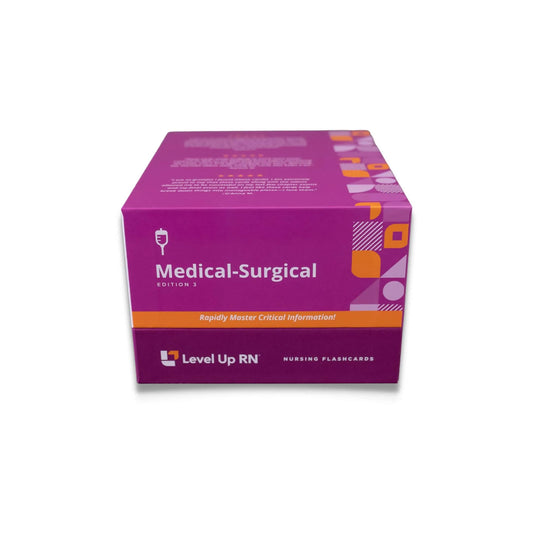Med-Surg - Nervous System, part 15: Macular Degeneration, Retinal Detachment, Meniere's Disease
Macular degeneration, including the difference between dry and wet macular degeneration, signs/symptoms, treatment, and patient teaching. Retinal detachment, including the pathophysiology, risk factors, signs/symptoms, and treatment of retinal detachment. Meniere's disease, including the pathophysiology, risk factors, signs/symptoms, treatment, and patient teaching for Meniere's disease.
Full Transcript: Med-Surg - Nervous System, part 15: Macular Degeneration, Retinal Detachment, Meniere's Disease
Full Transcript: Med-Surg - Nervous System, part 15: Macular Degeneration, Retinal Detachment, Meniere's Disease
Hi. I'm Cathy with Level Up RN. This is the last video in my medical surgical nursing nervous system playlist. I will be covering macular degeneration, retinal detachment as well as Meniere's disease. At the end of the video, I will give you guys a little quiz to test your knowledge of some of the key points I'll be making in this video. So definitely stay tuned for that. And as always, if you have our LevelUpRN medical surgical nursing flashcards, be sure to pull those out so you can follow along with me.
First up, we have macular degeneration, which is the deterioration of the macula, which is part of the retina at the back of the eye. And this results in a central loss of vision.
So we can either have dry or wet macular degeneration.
Dry is more common, and it's caused by these tiny clumps of protein called drusen that grow under the macula and cause that macula to become thinner and dry out. Like I said, it's more common and it has a slower onset than wet macular degeneration.
With wet macular degeneration, we have these abnormal blood vessels that grow under the retina and they leak blood or fluid into the macula causing scarring. So this is less common, but it has a faster onset.
So in terms of treatment, there is no cure for macular degeneration. However, with wet macular degeneration, we can use photodynamic therapy to seal off those blood vessels that are leaking in order to slow down the loss of central vision.
In terms of patient teaching, we want to advise our patients to quit smoking, wear sunglasses, definitely do their follow up care with their eye provider, and then make home modifications in order to provide for safety because they're going to have that loss of central vision.
Next, we have a retinal detachment, which is where we have separation of the retina from the underlying epithelium.
So the pathophysiology behind this is that we end up with vitreous humor that builds up behind the retina, and this pushes the retina away from the back of the eye and causes it to detach.
So risk factors associated with this disorder include aging, injury, family history, previous intraocular surgery, and ocular tumors.
In terms of signs and symptoms, the patient may complain of floaters, flashing lights, and a sudden, painless sensation of a curtain being drawn over their visual field.
In terms of treatment, this will require emergency surgery in order to repair the detached retina.
The last disorder I want to cover in this video is Meniere's disease, which is an inner ear disorder that causes issues with hearing and balance.
The exact cause of this disorder is not known, but it results in an accumulation of endolymphatic fluid in the inner ear and this causes three key symptoms.
The first is tinnitus, which is ringing in the ears.
The second is unilateral sensory neural hearing loss.
The third is vertigo, which is like a spinning sensation.
Risk factors associated with Meniere's disease include genetics, infection, as well as auto toxic medications. In addition to those three key signs and symptoms, the patient may also have issues with vomiting or balance issues.
In terms of treatment, there is no cure, the treatment will be supportive.
Medications that can be helpful include antihistamines, anticholinergics, diuretics, as well as antiemetics.
In terms of procedures, if the patient's Meniere's disease gets severe enough, they can have a labyrinthectomy, but if they do this they will have complete hearing loss on the affected side.
In terms of patient teaching, we want to advise our patient to avoid caffeine, smoking, and alcohol. We should also advise them to restrict their salt intake and distribute their fluid intake evenly throughout the day.
All right, you guys ready for your quiz? I have three questions. First question, macular degeneration will cause a loss of peripheral vision. True or false? The answer is false. It causes a loss of central vision. Question number two, if a patient says, "I feel like a curtain is being pulled over my eye," what eye disorder would you suspect? The answer is a retinal detachment. Question number three, what are the three key symptoms of Meniere's disease? The answer is tinnitus, unilateral hearing loss, and vertigo.
Okay, that is it for the nervous system. We got through all of these cards. So, good job. Thank you so much for watching. Take care and good luck with studying.


